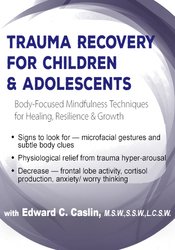

Child and adolescent victims of trauma, single episode or recurrent, are struggling to survive devastating and quite often unthinkable horrific experiences. Our goal is to insure that we prevent re-traumatization and hyper-arousal by employing time-proven and research driven effective therapeutic strategies.
Join Edward Caslin, LCSW, as he shares his clinical expertise in working with kids, both urban and suburban, facing single and recurrent traumas from:
He will show you how to treat kids to recognize their physiological responses to everyday triggers without re-activating their trauma arousal response to such stimuli through body focused mindfulness techniques. You will learn how to best help kids develop the necessary self-employed coping skills to contend with current and future situations. Kids will learn to choose to respond, not react, to daily trauma arousal stimuli and triggers through:
This course provides clinicians a change in assessment perspective validating adoption of time proven alternative approaches for expedient and effective trauma treatment of kids!!
| File type | File name | Number of pages | |
|---|---|---|---|
| Manual (0.90 MB) | 41 Pages | Available after Purchase |
Edward C. Caslin, MSW, SSW, LCSW, is a Licensed Clinical Social Worker, with over 30 years social work experience over a variety of clinical settings, including state psychiatric in-patient, alcohol-substance abuse outpatient, and public schools, specializing in trauma recovery work with inner city children and adolescents experiencing various emotional and behavioral needs. Edward works in public schools, while also providing in-home intensive community counseling to children and their families, and conducting private practice. He is involved with a grass roots organization “Advocacy for Emotional & Behavioral Disorders” in Jersey City, NJ to bring a voice to the needs of this often disenfranchised population among our youth. Edward has been an adjunct professor with Manhattan College’s Psychology Department. He holds a BA in Psychology from Manhattan College, with both an MSW and Post Master’s education from New York University. He is trained in Cognitive Behavioral Intervention for Trauma in Schools, along with experience in employing relaxation breathing, guided imagery, meditation, yoga and body-mindfulness in his work with children and adolescents.
Edward has extensive experience providing individual, group and family therapeutic services to children and teens, using an integrative and innovative approach that is informed by clinical theory and neuro-science research. He has provided in-service presentations on numerous topics, pertaining to emotional/behavioral disorders in youth and trauma recovery, professional consultation services for teachers, and supportive assistance to parents.
Speaker Disclosures:
Financial: Edward Caslin has an employment relationship with the Jersey City Public Schools. He receives a speaking honorarium from PESI, Inc. He has no relevant financial relationships with ineligible organizations.
Non-financial: Edward Caslin has no relevant non-financial relationship to disclose.
Trauma & Stress-Related Disorders in Kids
The Traumatized Brain and Neuroscience
Mindfulness Techniques to Repair the Brain
Mindfulness Techniques to Repair the Body
Ultimate Trauma Recovery
Please wait ...